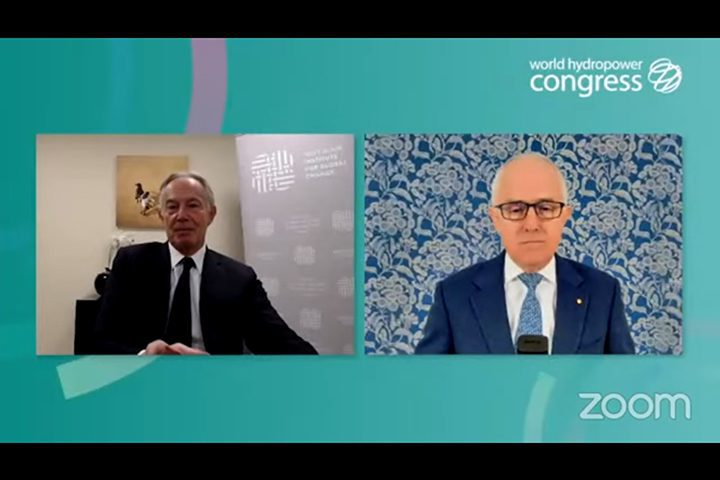Former Prime Ministers Tout Need for Pumped Storage and More Hydropower
Tony Blair and Malcolm Turnbull, former prime ministers of the UK and Australia, respectively, suggested pumped storage and more hydropower will be vitally important to electric grids around the world as more wind and solar are added to the power mix.
Speaking on the opening day of the World Hydropower Congress, which began Sept. 7 and will continue through Sept. 24, Turnbull described “the crisis within the climate crisis. And that is, the need for more long-duration storage, which is overwhelmingly pumped hydro, because we have a rush, thankfully, of cheaper and more effective variable renewable energy—wind and solar. But, of course, they only work when the wind is blowing or the sun is shining. So, you’ve got to have a means of storing that electricity so it’s available all the time, and, while batteries are very effective for short durations, for long-duration storage, we need more pumped storage.”
“I agree with what you’re saying that the idea of long-duration storage is absolutely essential,” Blair said. “Pumped hydro is going to be one of the principal means of achieving that. And the question, therefore, is how do we implement sufficient projects at scale to make a real difference?”

Turnbull pointed out that hydropower systems don’t have to involve rivers and massive dams. “In the context of pumped hydro, all you need is two reservoirs—they don’t have to be huge—at differing elevations,” he said. “So, you can create a reservoir on top of a hill and a reservoir at the bottom, fill one of them with water, and then just pump the water up when electricity is cheap and run it down to generate electricity when prices and demand is higher. And this off-river pumped storage is a huge opportunity, because you can do it in a way that has no environmental impact and, in particular, doesn’t affect any rivers or streams or ecosystems of that kind.”
Blair said attracting investors for hydro projects can be a challenge. He noted that there is often substantial risk involved, sometimes of a political nature, and getting a decent rate of return on investment is important in attracting private capital. “The projects themselves are necessary, and they’re almost certainly viable, if you can put together the right financial structure for them. Now, this is something which could be organized. You need to guarantee and underwrite the political and financial risks,” he said.
“There are a lot of things that we’ve taken for granted in electricity markets. The inertia, that is, frequency maintenance, that comes from having big spinning machines in coal-fired power stations,” said Turnbull. “As we move to more intermittent generation from wind farms or inverter-based systems, like from solar panels, that frequency maintenance and other ancillary services has got to be provided. And this is where hydro is so important.”
“We know it can make a big difference, we know there are big projects that need to be done and other small-scale projects, and we know what the problem is. The problem is putting it together with the right financing and the right regulatory framework and underwriting the political risks,” Blair concluded.
“I think the good news is that with the right planning we’ve got the renewable technologies to deliver cheaper electricity, and at the same time, reliable and more affordable electricity, as long as we do the long-term planning,” said Turnbull. “So, in a sense, the scarcest resource is not electrons, but leadership and foresight.”
Blair served as the UK’s prime minister from 1997 to 2007. His government was one of the first to sign the landmark Kyoto Protocol under which industrialized nations first committed to cut their greenhouse gas emissions. Blair is now the executive chairman of the Tony Blair Institute for Global Change. “The purpose of my institute is to try and put forward practical solutions to the big global challenges, and one of those honestly is around climate change,” he said.
Turnbull served as prime minister of Australia from 2015 to 2018. While in office, he spearheaded efforts to expand renewable energy generation and storage capacity, including by helping initiate the Snowy Hydro 2.0 pumped hydro scheme, the largest of its kind in the Southern Hemisphere. He is currently co-chair of the International Forum on Pumped Storage Hydropower.
—Aaron Larson is POWER’s executive editor (@AaronL_Power, @POWERmagazine).